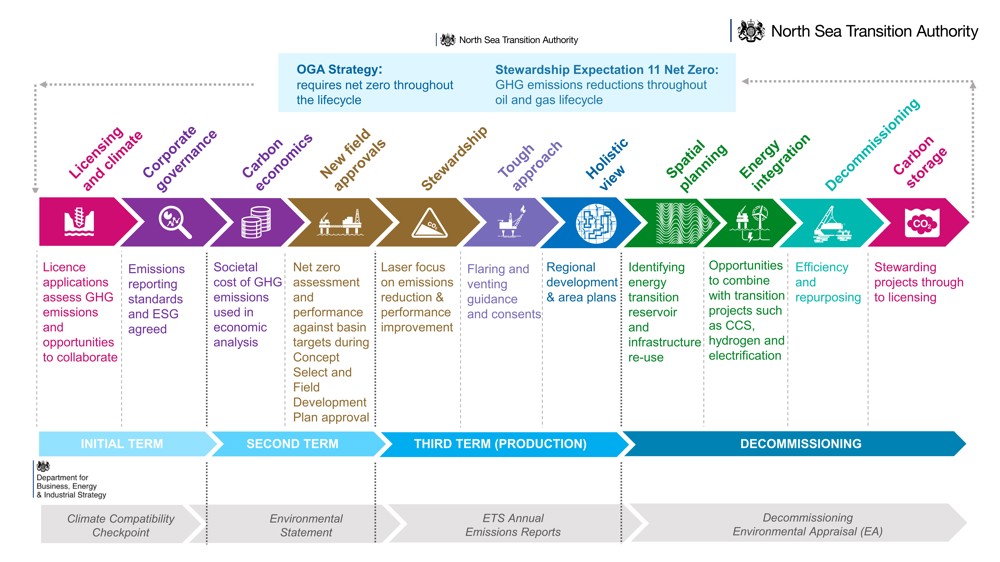
The NSTA is fully committed to enabling the achievement of the UK government's commitment to reach net zero emissions by 2050, while supporting energy resilience and the drive to develop home-grown hydrogen and carbon storage.
The image below is a high-level, simplified illustration of the NSTA’s approach to net zero regulation, throughout the project lifecycle, and our main activities and processes:

The NSTA is working with government and industry on the vital role that the oil and gas industry must play in the UK energy transition – in driving to net zero carbon across the UKCS as quickly as possible – and on realising the enormous potential of the UK Continental Shelf (UKCS) as a critical energy and carbon abatement resource.
Government forecasts show that oil and gas will remain an important part of our energy mix for the foreseeable future, including under net zero.
Managing the declining production and maximising value from the UKCS as cleanly and efficiently as possible to meet this demand - as long as it exists - from domestic production also has broader economic benefits including jobs and future exchequer revenues.
The NSTA puts net zero considerations at the heart of its core business, including:
- Renewing its Strategy to integrate net zero, and updated and published new guidance to reflect this, including FDP guidance, net zero stewardship expectations, flaring and venting guidance and a note on carbon valuation methodology
- Considering the net zero aspects of proposals in its regulatory decisions
- Publishing our annual Emissions Monitoring Report , holding industry to account and driving North Sea energy transition
- Adding net zero as a key theme in benchmarking to drive performance improvement
- Leading a study into offshore energy integration to build closer links between oil and gas and renewables and reduce carbon emissions from oil and gas production
- Stewarding carbon storage projects and launching the UK’s first carbon storage licensing round, in support of UK industry and the government’s CCS ambition
- Enhancing systems to be ready for offshore hydrogen transport and storage approvals to support the growth of a key net zero sector
Net zero assessment
The NSTA takes a life cycle approach to net zero regulation, including through our Strategy, and our range of regulatory levers as set out above. As part of that, for decisions like approving field developments, the NSTA also considers a number of factors sometimes collectively referred to as an ‘effective net zero assessment’.
This approach may include an economic assessment with societal GHG costs; consideration of lifetime production against UK future demand; production emissions impact on the North Sea Transition Deal emissions reductions targets; fit with NSTA guidance and expectations; and where applicable also a range of other factors such as infrastructure reuse, carbon storage impact and any particular UKCS spatial synergies or overlaps.


